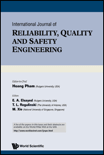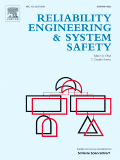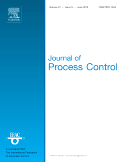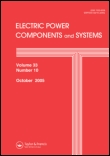
International Journal of Reliability Quality and Safety Engineering
Scope & Guideline
Pioneering Research for Dependable Engineering Solutions
Introduction
Aims and Scopes
- Reliability Engineering:
The journal emphasizes the development and application of reliability engineering principles, including modeling, assessment, and optimization of systems to ensure their functionality and performance over time. - Quality Control and Improvement:
Research focusing on quality control methodologies, statistical process control, and quality improvement techniques is a core area, aiming to enhance product and service quality in various industries. - Safety Engineering:
The journal covers safety engineering topics, including risk assessment, safety management systems, and safety-related software, to promote safe operational practices in engineering. - Statistical Modeling and Data Analysis:
A significant focus is placed on statistical methods for reliability and quality analysis, including Bayesian methods, machine learning, and advanced statistical techniques for analyzing complex data. - Maintenance Strategies:
The journal explores innovative maintenance strategies and policies, emphasizing preventive and predictive maintenance approaches to enhance system reliability and reduce downtime. - Software Reliability:
Research on software reliability, including software reliability growth models and testing strategies, is a vital aspect, reflecting the growing importance of software systems in engineering.
Trending and Emerging
- Machine Learning and AI in Reliability:
There is a significant increase in research exploring the application of machine learning and artificial intelligence techniques in reliability and quality engineering, indicating a shift towards data-driven approaches. - Integrated Maintenance Strategies:
Emerging themes focus on integrated maintenance strategies that combine predictive maintenance, condition monitoring, and real-time analytics to optimize system performance and reliability. - Complex Systems Reliability:
Research on the reliability of complex systems, such as networked and distributed systems, is gaining traction, reflecting the need to address the challenges posed by interconnected engineering systems. - Software Reliability and Testing Innovations:
The journal is increasingly publishing papers on innovative software reliability testing and assessment methods, emphasizing the importance of software performance in overall system reliability. - Risk Assessment with Advanced Analytics:
The application of advanced analytics and decision-making frameworks in risk assessment is trending, showcasing a move towards more sophisticated and data-informed safety management practices.
Declining or Waning
- Traditional Reliability Models:
While traditional reliability models have been foundational, there appears to be a decline in novel contributions to this area, as more researchers focus on integrating advanced computational methods and machine learning into reliability studies. - Deterministic Quality Control Approaches:
Research centered around deterministic quality control techniques seems to be diminishing as industry trends shift towards more flexible, adaptive, and data-driven quality improvement methodologies. - Static Risk Assessment Models:
Static models for risk assessment are becoming less prominent as dynamic and real-time risk management approaches gain traction, reflecting the need for more responsive safety engineering solutions. - Single-Factor Maintenance Policies:
Research focusing on single-factor maintenance policies is waning, with a noticeable shift towards multi-objective and integrated maintenance strategies that consider various system parameters and uncertainties.
Similar Journals

RELIABILITY ENGINEERING & SYSTEM SAFETY
Advancing the Frontiers of Reliability and Safety.RELIABILITY ENGINEERING & SYSTEM SAFETY is a leading interdisciplinary journal published by Elsevier Sci Ltd, dedicated to advancing knowledge in the fields of applied mathematics, industrial and manufacturing engineering, and safety, risk, reliability, and quality. With a significant presence since its inception in 1983, this esteemed journal, identifiable by ISSN 0951-8320 and E-ISSN 1879-0836, holds an impressive impact factor and ranks in the top quartile (Q1) of its categories according to the most recent metrics. Specifically, it has achieved remarkable standings in Scopus, ranking #3 out of 207 in Safety, Risk, Reliability and Quality, marking it in the 98th percentile, and #21 out of 384 in Industrial and Manufacturing Engineering, at the 94th percentile. This distinction underscores the journal's vital role in shaping research and innovation in its fields. While it does not operate under an open access model, RELIABILITY ENGINEERING & SYSTEM SAFETY remains an essential resource for researchers, professionals, and students, aiming to publish high-quality articles that facilitate the understanding and application of reliability engineering and systemic safety within various industrial contexts. Stay ahead in cutting-edge research by engaging with the latest articles and findings from this influential journal.

International Journal of System Assurance Engineering and Management
Driving Innovation in Engineering and Management DisciplinesThe International Journal of System Assurance Engineering and Management, endorsed by SPRINGER INDIA, stands as a pivotal platform in the field of Safety, Risk, Reliability, Quality, Strategy, and Management. Established in 2010, this peer-reviewed journal offers a rich repository of innovative research and practical insights that address contemporary challenges in system assurance across various sectors. With a commendable Q2 category ranking in both Safety, Risk, Reliability, and Quality, as well as in Strategy and Management for 2023, the journal is recognized for its rigorous standards and significant contribution to the academic community. Although it operates under a subscription model, the journal ensures wide dissemination of critical findings to its readership, which includes researchers, industry professionals, and students. With its Scopus rankings affirming its impact—ranked #71/207 in Safety, Risk, Reliability and Quality, and #198/478 in Strategy and Management—the journal is a must-read for those seeking to enhance their knowledge and application of engineering and management principles in real-world settings.

ACCREDITATION AND QUALITY ASSURANCE
Driving Excellence through Rigorous Research.ACCREDITATION AND QUALITY ASSURANCE is a distinguished academic journal published by Springer, focusing on the pivotal intersections of quality assurance, accreditation, and their implications across various disciplines including Chemical Engineering, Chemistry, Instrumentation, and Safety, Risk, Reliability, and Quality. With its ISSN 0949-1775 and E-ISSN 1432-0517, this journal serves as a crucial platform for researchers, professionals, and students aiming to contribute to the enhancement of quality standards in these fields. Since its inception in 1996, the journal has maintained a consistent commitment to disseminating high-quality research, achieving a Category Quartile ranking of Q3 across multiple relevant categories in 2023, reflecting its ongoing impact and relevance in the academic community. While not currently following an open access model, it remains an essential resource for those seeking to stay abreast of the latest developments and research in accreditation and quality assurance practices. With a publication horizon extending towards 2024, ACCREDITATION AND QUALITY ASSURANCE continues to foster scholarly dialogue essential for driving advancements in quality management and global standards.

International Journal of Quality & Reliability Management
Fostering Reliability in Diverse SectorsInternational Journal of Quality & Reliability Management is a leading academic journal devoted to the exploration of quality management and reliability engineering within organizational contexts. Published by EMERALD GROUP PUBLISHING LTD, this journal has been a pivotal resource since its inception in 1970, with a scope that encompasses interdisciplinary approaches to improve quality and reliability across various sectors. Operating from the United Kingdom, it ranks in the Q2 category for both Business, Management, and Accounting, and Strategy and Management, signifying its esteemed reputation and contribution to the field. With an impressive standing in Scopus, the journal ranks 61 out of 218 in general business, and 153 out of 478 in strategy and management. Although it does not currently offer open access options, its rich content is indispensable for researchers, professionals, and students focused on developing strategic quality initiatives and enhancing operational reliability. With a comprehensive convergence of scholarly articles and case studies, the International Journal of Quality & Reliability Management remains an essential venue for advancing knowledge and practice in quality management and reliability disciplines.

Journal of Machinery Manufacture and Reliability
Championing open access for groundbreaking manufacturing research.The Journal of Machinery Manufacture and Reliability, published by PLEIADES PUBLISHING INC, serves as a pivotal platform for advancing knowledge in the fields of Industrial and Manufacturing Engineering, Mechanical Engineering, and Safety, Risk, Reliability, and Quality. Having adopted an Open Access model since 2015, this journal facilitates global dissemination of research findings and innovations, ensuring that critical developments in machinery manufacture resonate across the academic and professional spectrum. With its ISSN 1052-6188 and E-ISSN 1934-9394, it has established itself within established quartiles, notably Q3 in key engineering categories according to the 2023 metrics. Its Scopus rankings underscore its emerging impact, though it remains an area for growth, making it an excellent venue for early-career researchers aiming to contribute to a growing body of literature. The journal's commitment to high-quality, accessible research positions it as a must-read for academics and practitioners alike, fostering innovation and collaboration in the machinery manufacturing sector.

JOURNAL OF PROCESS CONTROL
Elevating Standards in Process Control Research.JOURNAL OF PROCESS CONTROL, published by Elsevier Science Ltd, is a pivotal resource for those engaged in the fields of process automation, control systems, and industrial engineering. With an ISSN of 0959-1524 and an E-ISSN of 1873-2771, this esteemed journal has been disseminating high-quality research since its inception in 1991, maintaining a convergence period up to 2024. Recognized in the 2023 category quartiles as a Q2 journal in Computer Science Applications and Control and Systems Engineering, and holding a prestigious Q1 ranking in Industrial and Manufacturing Engineering and Modeling and Simulation, it stands out for its contributions to theory and practice. The journal's access options provide easy engagement for researchers and practitioners alike. The impact factor emphasizes its significance, reflecting its reputation as a leading platform for innovative findings and methodologies across diverse disciplines, making it an essential tool for those advancing the frontiers of process control research.

Proceedings of the Institution of Mechanical Engineers Part O-Journal of Risk and Reliability
Transforming Knowledge into Practice for a Safer Tomorrow.Proceedings of the Institution of Mechanical Engineers Part O – Journal of Risk and Reliability is a highly regarded journal published by SAGE Publications Ltd, specializing in the critical fields of Safety, Risk, Reliability, and Quality. Established in 2006 and extending its coverage until 2024, this journal serves as a vital platform for researchers and professionals to disseminate innovative findings and discuss emerging trends and methodologies related to risk assessment and reliability engineering. With an impact factor that places it in the Q2 quartile of its category and ranked 69th out of 207 in Scopus, it has garnered significant attention within the academic community, ensuring robust visibility and influence. Readers can expect rigorous peer-reviewed articles that contribute to advancing knowledge and practices in the field, fostering a deeper understanding of the complexities and integral practices essential for safety and reliability. As a leading publication within the United Kingdom, it continues to play an instrumental role in shaping contemporary discussions and research in this vital sector.

ELECTRIC POWER COMPONENTS AND SYSTEMS
Driving Progress in Renewable Energy and Power DistributionELECTRIC POWER COMPONENTS AND SYSTEMS is a respected peer-reviewed journal dedicated to advancing the field of electrical and electronic engineering, energy engineering, and power technology. Published by Taylor & Francis Inc, this journal boasts a dynamic scope that encompasses a wide array of topics relevant to power systems, including renewable energy, power distribution, and component reliability. With an impact factor indicative of its ongoing contribution to research, it ranks in the Q3 category across multiple engineering disciplines according to the latest metrics. Researchers and professionals will find this journal an invaluable resource, offering insights into the latest developments and innovations in electric power systems from its inception in 2000 to the current era and beyond. Accessible online with Open Access options, it caters to both established experts and emerging scholars looking to deepen their knowledge and foster collaboration within this critical field.

Journal of Failure Analysis and Prevention
Empowering Engineers with Insightful AnalysesJournal of Failure Analysis and Prevention, published by SpringerNature, stands as a vital resource in the fields of Materials Science, Mechanical Engineering, and Safety, Risk, Reliability and Quality. With an ISSN of 1547-7029 and an E-ISSN of 1864-1245, this journal has been dedicated to advancing the understanding of failure mechanisms and prevention strategies since its inception in 2001. Its convergence of rigorous research from various domains underscores its importance, achieving a Q3 classification across multiple engineering categories as of 2023. As of the latest rankings, it holds significant positions, including #114 in Safety, Risk, Reliability and Quality and #408 in Mechanical Engineering, illustrating its role in fostering scholarly dialogue and innovation. Although it does not currently offer open-access options, the journal endeavors to be accessible for researchers and professionals seeking impactful, high-quality analyses that inform both safety practices and engineering improvements. Whether you are a researcher pushing the boundaries of knowledge or a professional applying these principles, the Journal of Failure Analysis and Prevention is an indispensable part of your academic toolkit.

Advances and Applications in Statistics
Connecting Ideas, Shaping Statistical FuturesAdvances and Applications in Statistics is a pivotal academic journal devoted to the dissemination of high-quality research findings in the field of statistics and its diverse applications. Published by PUSHPA PUBLISHING HOUSE, this journal aspires to serve as a dynamic platform for researchers, professionals, and students who aim to share innovative statistical methodologies and explore their practical implications across various disciplines. The journal, with its influential ISSN 0972-3617, fosters open discussion and collaboration within the statistical community, aiming to bridge theoretical advancements with real-world applications. As part of its ongoing commitment to academic integrity and excellence, Advances and Applications in Statistics encourages submissions that not only advance statistical theory but also illustrate their utility in solving contemporary issues in industries such as healthcare, finance, and economics. Although currently lacking an impact factor, the journal's dedication to quality research positions it as a significant contributor to the field. Researchers and academics looking to publish their work in a stimulating and supportive environment will find in this journal a valuable resource.